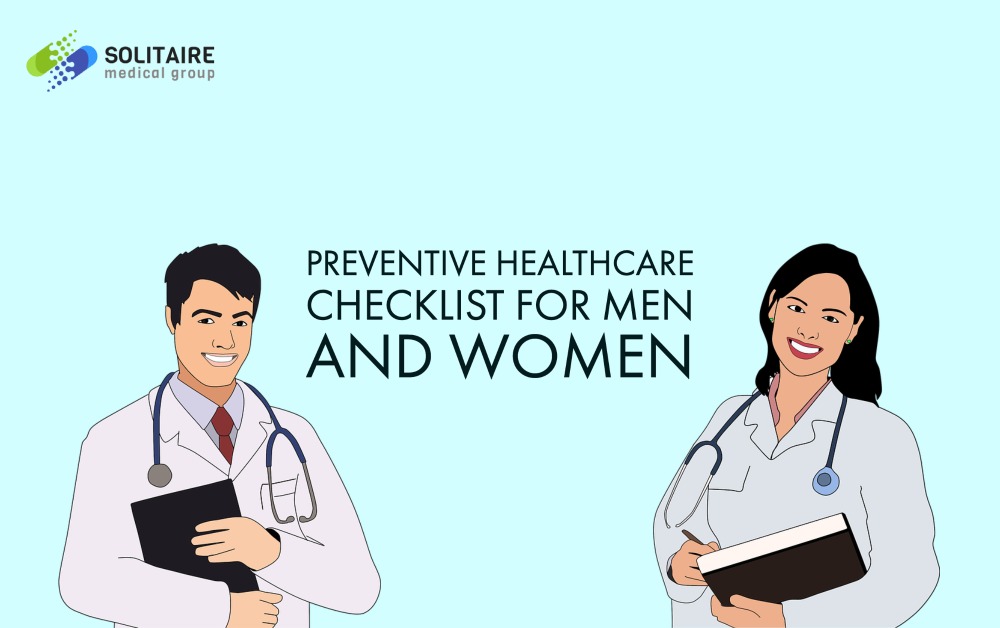Prevention is the first line of defence when it comes to your health. And when doing so a doctor’s visit is the best to learn more about your medical needs.
Think of preventive healthcare as a future investment. It helps to prevent or delay the onset of many illnesses including chronic diseases even before they can occur.
When you make your health a priority, the best way to start your journey is with a preventive healthcare checklist. This checklist must highlight your individual medical needs, immunisation and regular screenings that can help you make the right health choice.
With that being said, both women and men have unique health requirements that keep changing throughout their life.
For example, what was once thought of as a “man’s disease”, heart disease impacts both men and women in different ways. While more women are likely to die from a heart disease, men tends to show more prominent early symptoms of the disease.
In order to help you take the right preventive measures, Solitaire Medical Group has come up with a unique preventive healthcare checklist for both women and men.
Preventive Healthcare Checklist for Women

1) General health check for women
Women are recommended to have a general health check with a GP every year. Part of the check-up will involve discussing your general health, your medical history, your lifestyle choices including diet, safe health practice and many more.
Seeing your doctor for regular health checks will enable them to spot early signs of diseases.
For more information on general health-checks for women, visit Better Health, Victoria.
2) Breast cancer screening
Breast cancer is the second most leading cause of cancer death amongst Australian women. However, at the same time, if breast cancer is diagnosed early, the first five-year survival rate still stands at 99%.
Mammography is the recommended screening tool for detecting early signs of breast cancer by Cancer Council, Australia.
Although mammography remains the gold standard to detect breast cancer, your doctors can also arrange for an ultrasound or MRI if deemed necessary.
3) Reproductive Health
Reproductive and sexual health is not just physical well-being.
It includes an effective method for contraception, timely cervical cancer screenings, discussing sexual health needs with healthcare providers and healthcare services associated with different stages of pregnancy.
For cervical cancer prevention, the National Cervical Screening Program recommends every woman aged 25 to 74 years to undergo a screening test every 5 years.
Preventive Healthcare Checklist for Men

1) Heart health
As men age, cardiovascular health becomes a bigger priority. Quitting smoking and not drinking excessive alcohol are absolute starters for healthy heart health. But, other factors including weight, blood pressure, cholesterol, diet, stress and physical activity must be addressed to lead a heart-healthy life.
A Healthy Heart Check should be performed annually if you are aged 45-74 years or of Aboriginal or Torres Strait Islander descent and over 30 years.
Dr Shahid Hafeez is our specialist cardiologist, who is available for consultation at our Cross Keys Medical Centre.
2) Diabetes check
Diabetes is a global public health issue. Approximately 1 million Australians have been diagnosed with Diabetes with the prevalence of Type 2 Diabetes higher in men than women.
According to a BBC report on diabetes, men are more prone to suffering from Type 2 diabetes because men have to gain less weight than women to develop the condition.
Any man with a previous history of gastrointestinal diabetes, heart stroke and/or over the age of 55, must take a regular diabetes screening test.
Mrs Halen Millar is our in-house Diabetes Educator who is available for consulting at our Modbury North Medical Centre.
3) Prostate cancer screening
Regular prostate-specific antigen tests (PSA) which are capable of detecting prostate cancer may not be entirely necessary, but be sure to talk to your doctors about the benefits and risks of this test.
All men aged 50 or above or at a higher risk of prostate cancer must talk to their GP’s about screening tests.
To book an appointment at your preferred location, visit,

